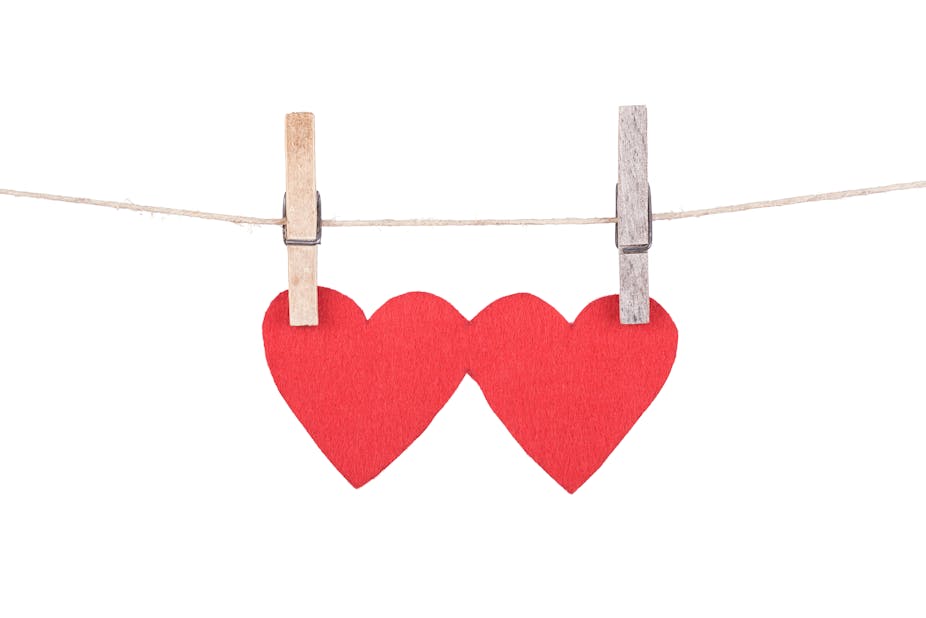Love it or loathe it, Valentine’s Day is a celebration of romantic love. But what exactly is romantic love? Researchers are increasingly interested in this question, and the answer is not at all clear.
What is an emotion?
Everyone from Plato to Taylor Swift has pondered the meaning of love. But, in the last two decades, researchers in the humanities and across the social, behavioural and cognitive sciences have also investigated romantic love.
Most – though not all – researchers are happy to call romantic love a human emotion. But what researchers mean by “emotion” varies.
Some explain emotions as hard-wired biological processes that are innate to humans. Others talk about them as behaviours or experiences that involve cognitive judgements. And still others think emotions are socially constructed, meaning they are social rather than natural phenomena.
Romantic love: universal or changeable?
Almost everyone separates out romantic love from other kinds of love or intimacy. This separation is usually about sex: when most people talk about romantic love, they mean love that involves sexual desire.
Many researchers think this kind of love is experienced by all people across time and place, and there is research to support this. Anthropological studies of romantic love across cultures show that love is likely to be a universal human emotion. Neuroscientific investigations of romantic love find similarities in the brain activity or chemistry of people who report being in love.
But the historian William Reddy cautions us not to “make too much of” similarities in romantic love across cultures, and with good reason. There is ample evidence that romantic love varies over time and place.
Cross-cultural studies of romantic love show significant differences in the emotion. And historical investigations almost always demonstrate changes in how people experience or imagine romantic love over time. Is romantic love universal or changeable? There is research to support both viewpoints.
Radical or conservative?
Some of the most interesting research into romantic love looks at its personal and political effects. As the sociologist Mary Evans explains, falling in love is meant to take lovers to a new and different place. Studies of people who are in love report that we understand romantic love as transformative.
And researchers sometimes talk about romantic love as a radical or subversive emotion with the potential to transform society. We can see this particularly in investigations of courtly love. Courtly love was a model of “aristocratic courtship” found in the literature of medieval France. Historians of courtly love often talk about it as a kind of radical resistance to the power of the church.
Others talk about romantic love as a deeply problematic emotion in desperate need of critique. These researchers would say that we may think romantic love is the site of personal freedom, but in fact we are living under “government by love”.
This critique was more common in the 1970s, when radical second-wave feminists attacked heterosexual romantic love as oppressive. But some researchers continue to explain romantic love as one of the ways our lives are regulated and controlled, limiting our intimate possibilities.
I want to know what love is
Some might say all this proves is that we should stop thinking we can research and understand emotions, and just experience them. But I don’t think so. Emotional experiences are a very significant part of our everyday lives, but they also have public and political effects.
Research into emotions gives us insight into the shape of these effects. It shows us the way that war widows were mobilised by their grief in 20th-century Australia, or how acknowledgements of national guilt for past injustices might lead to restitution for the disenfranchised.
Research into romantic love is built on people’s experiences and understandings of their intimate lives. What if love seems muddy in this research because people’s understandings and experiences of intimacy are muddy? What if the diverse ways that people live their intimate lives cannot be explained by a specific singular category, “romantic love”?
If that’s the case, then we don’t really need to worry about fitting into any particular romantic ideal this Valentine’s Day. And romantic love can be whatever we want it to be. Embrace it, avoid it, remake it in your own way. Love your partner, your cat, your friends, everyone, nobody. And don’t apologise for it.

